Bachelor Nursing: AHPRA Standards for Safe and Quality Nursing Care
VerifiedAdded on 2023/06/05
|8
|2068
|474
Essay
AI Summary
This bachelor nursing assignment delves into the AHPRA (Australian Health Practitioner Regulation Agency) standards for registered nurses, specifically focusing on Standard 3 (maintains the capability for practice) and Standard 6 (provide safe, appropriate, and responsive quality nursing practice). It emphasizes the importance of these standards in ensuring patient safety, promoting health literacy, and fostering professional development among nurses. The essay highlights the role of nurses in advocating for patients, collaborating with multidisciplinary teams, and continuously improving their practice through reflection and feedback. Practical examples from clinical experience are provided to illustrate the application of these standards in real-world scenarios, demonstrating how nurses contribute to high-quality healthcare and support the well-being of patients and their families. The conclusion reinforces the significance of AHPRA standards in protecting the public and advancing the nursing profession.
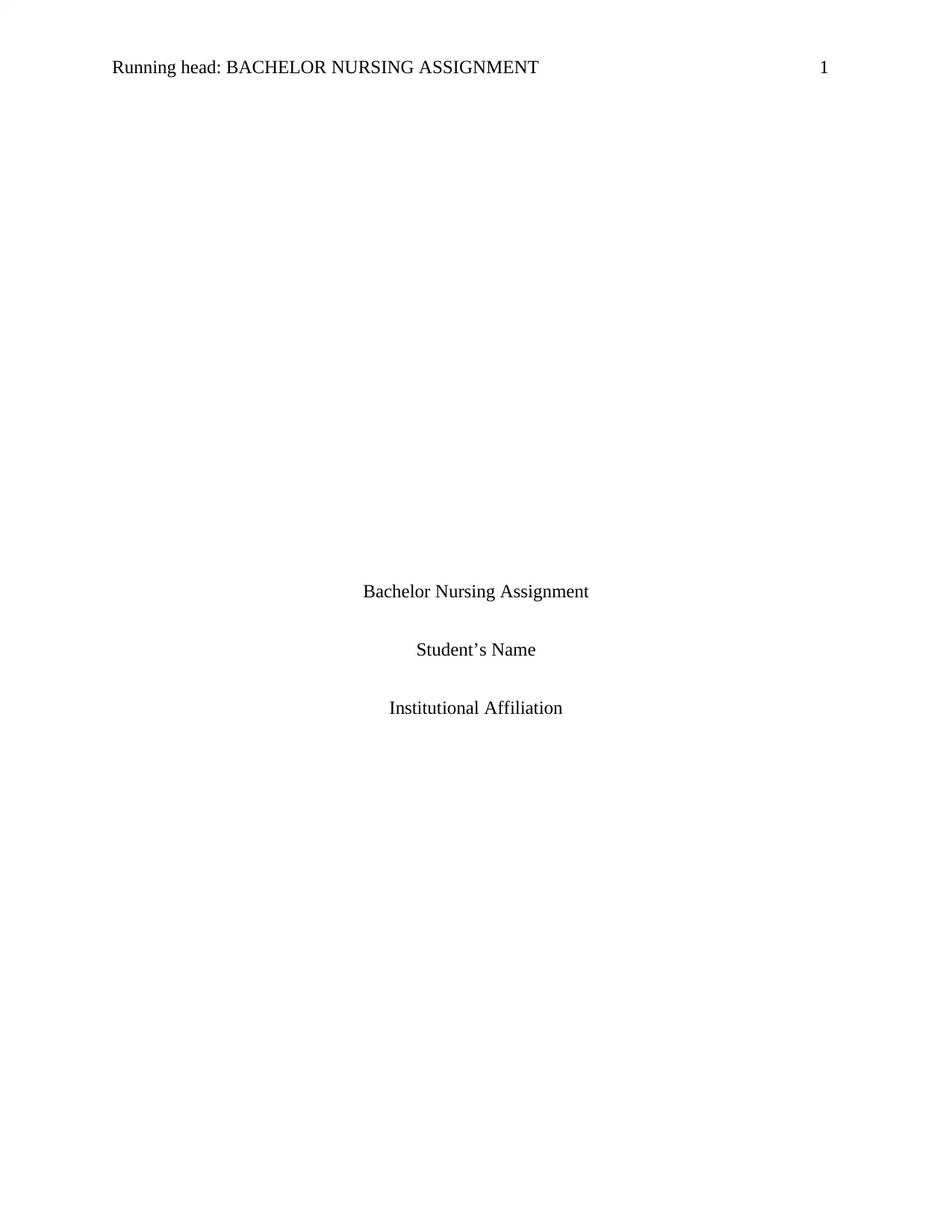
Running head: BACHELOR NURSING ASSIGNMENT 1
Bachelor Nursing Assignment
Student’s Name
Institutional Affiliation
Bachelor Nursing Assignment
Student’s Name
Institutional Affiliation
Paraphrase This Document
Need a fresh take? Get an instant paraphrase of this document with our AI Paraphraser
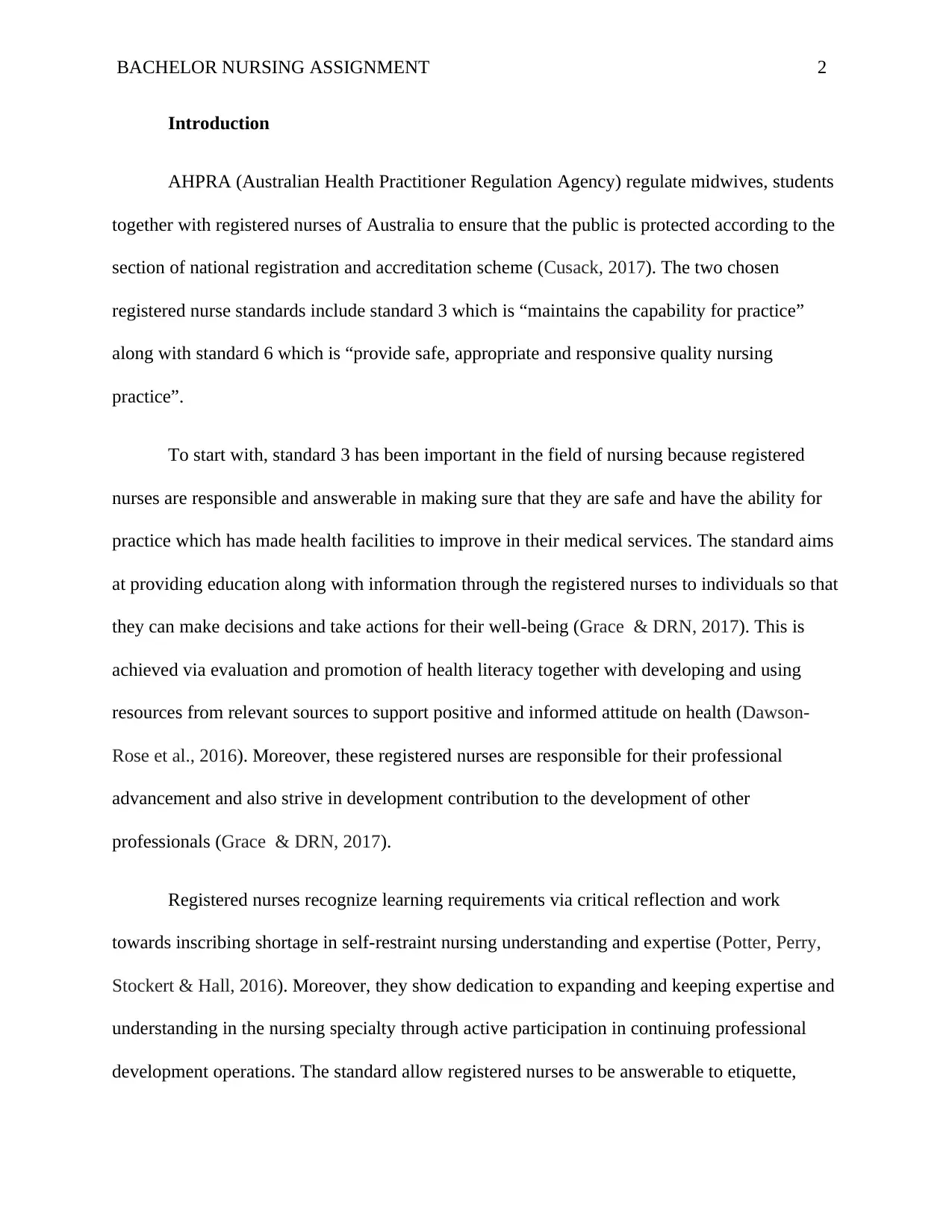
BACHELOR NURSING ASSIGNMENT 2
Introduction
AHPRA (Australian Health Practitioner Regulation Agency) regulate midwives, students
together with registered nurses of Australia to ensure that the public is protected according to the
section of national registration and accreditation scheme (Cusack, 2017). The two chosen
registered nurse standards include standard 3 which is “maintains the capability for practice”
along with standard 6 which is “provide safe, appropriate and responsive quality nursing
practice”.
To start with, standard 3 has been important in the field of nursing because registered
nurses are responsible and answerable in making sure that they are safe and have the ability for
practice which has made health facilities to improve in their medical services. The standard aims
at providing education along with information through the registered nurses to individuals so that
they can make decisions and take actions for their well-being (Grace & DRN, 2017). This is
achieved via evaluation and promotion of health literacy together with developing and using
resources from relevant sources to support positive and informed attitude on health (Dawson-
Rose et al., 2016). Moreover, these registered nurses are responsible for their professional
advancement and also strive in development contribution to the development of other
professionals (Grace & DRN, 2017).
Registered nurses recognize learning requirements via critical reflection and work
towards inscribing shortage in self-restraint nursing understanding and expertise (Potter, Perry,
Stockert & Hall, 2016). Moreover, they show dedication to expanding and keeping expertise and
understanding in the nursing specialty through active participation in continuing professional
development operations. The standard allow registered nurses to be answerable to etiquette,
Introduction
AHPRA (Australian Health Practitioner Regulation Agency) regulate midwives, students
together with registered nurses of Australia to ensure that the public is protected according to the
section of national registration and accreditation scheme (Cusack, 2017). The two chosen
registered nurse standards include standard 3 which is “maintains the capability for practice”
along with standard 6 which is “provide safe, appropriate and responsive quality nursing
practice”.
To start with, standard 3 has been important in the field of nursing because registered
nurses are responsible and answerable in making sure that they are safe and have the ability for
practice which has made health facilities to improve in their medical services. The standard aims
at providing education along with information through the registered nurses to individuals so that
they can make decisions and take actions for their well-being (Grace & DRN, 2017). This is
achieved via evaluation and promotion of health literacy together with developing and using
resources from relevant sources to support positive and informed attitude on health (Dawson-
Rose et al., 2016). Moreover, these registered nurses are responsible for their professional
advancement and also strive in development contribution to the development of other
professionals (Grace & DRN, 2017).
Registered nurses recognize learning requirements via critical reflection and work
towards inscribing shortage in self-restraint nursing understanding and expertise (Potter, Perry,
Stockert & Hall, 2016). Moreover, they show dedication to expanding and keeping expertise and
understanding in the nursing specialty through active participation in continuing professional
development operations. The standard allow registered nurses to be answerable to etiquette,
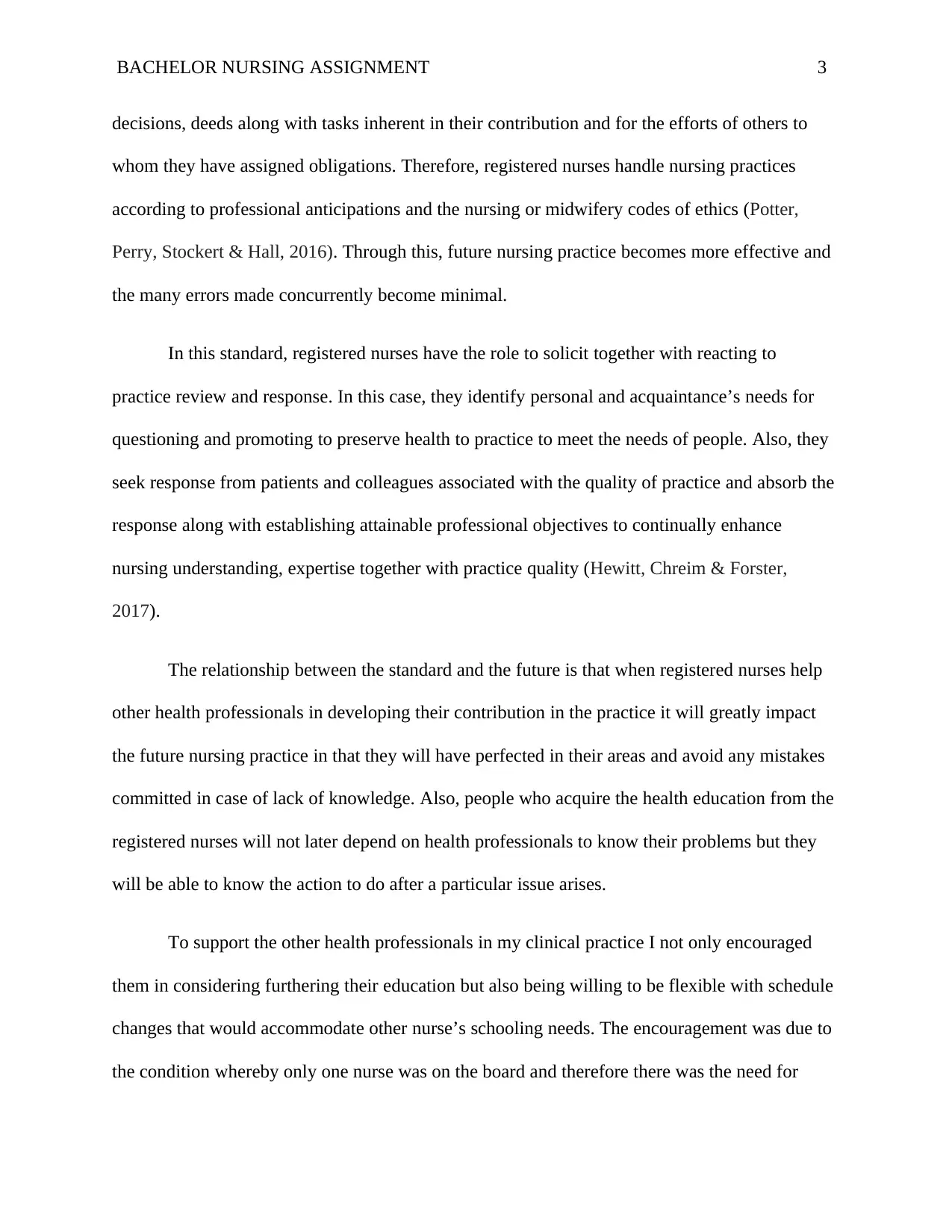
BACHELOR NURSING ASSIGNMENT 3
decisions, deeds along with tasks inherent in their contribution and for the efforts of others to
whom they have assigned obligations. Therefore, registered nurses handle nursing practices
according to professional anticipations and the nursing or midwifery codes of ethics (Potter,
Perry, Stockert & Hall, 2016). Through this, future nursing practice becomes more effective and
the many errors made concurrently become minimal.
In this standard, registered nurses have the role to solicit together with reacting to
practice review and response. In this case, they identify personal and acquaintance’s needs for
questioning and promoting to preserve health to practice to meet the needs of people. Also, they
seek response from patients and colleagues associated with the quality of practice and absorb the
response along with establishing attainable professional objectives to continually enhance
nursing understanding, expertise together with practice quality (Hewitt, Chreim & Forster,
2017).
The relationship between the standard and the future is that when registered nurses help
other health professionals in developing their contribution in the practice it will greatly impact
the future nursing practice in that they will have perfected in their areas and avoid any mistakes
committed in case of lack of knowledge. Also, people who acquire the health education from the
registered nurses will not later depend on health professionals to know their problems but they
will be able to know the action to do after a particular issue arises.
To support the other health professionals in my clinical practice I not only encouraged
them in considering furthering their education but also being willing to be flexible with schedule
changes that would accommodate other nurse’s schooling needs. The encouragement was due to
the condition whereby only one nurse was on the board and therefore there was the need for
decisions, deeds along with tasks inherent in their contribution and for the efforts of others to
whom they have assigned obligations. Therefore, registered nurses handle nursing practices
according to professional anticipations and the nursing or midwifery codes of ethics (Potter,
Perry, Stockert & Hall, 2016). Through this, future nursing practice becomes more effective and
the many errors made concurrently become minimal.
In this standard, registered nurses have the role to solicit together with reacting to
practice review and response. In this case, they identify personal and acquaintance’s needs for
questioning and promoting to preserve health to practice to meet the needs of people. Also, they
seek response from patients and colleagues associated with the quality of practice and absorb the
response along with establishing attainable professional objectives to continually enhance
nursing understanding, expertise together with practice quality (Hewitt, Chreim & Forster,
2017).
The relationship between the standard and the future is that when registered nurses help
other health professionals in developing their contribution in the practice it will greatly impact
the future nursing practice in that they will have perfected in their areas and avoid any mistakes
committed in case of lack of knowledge. Also, people who acquire the health education from the
registered nurses will not later depend on health professionals to know their problems but they
will be able to know the action to do after a particular issue arises.
To support the other health professionals in my clinical practice I not only encouraged
them in considering furthering their education but also being willing to be flexible with schedule
changes that would accommodate other nurse’s schooling needs. The encouragement was due to
the condition whereby only one nurse was on the board and therefore there was the need for
⊘ This is a preview!⊘
Do you want full access?
Subscribe today to unlock all pages.

Trusted by 1+ million students worldwide
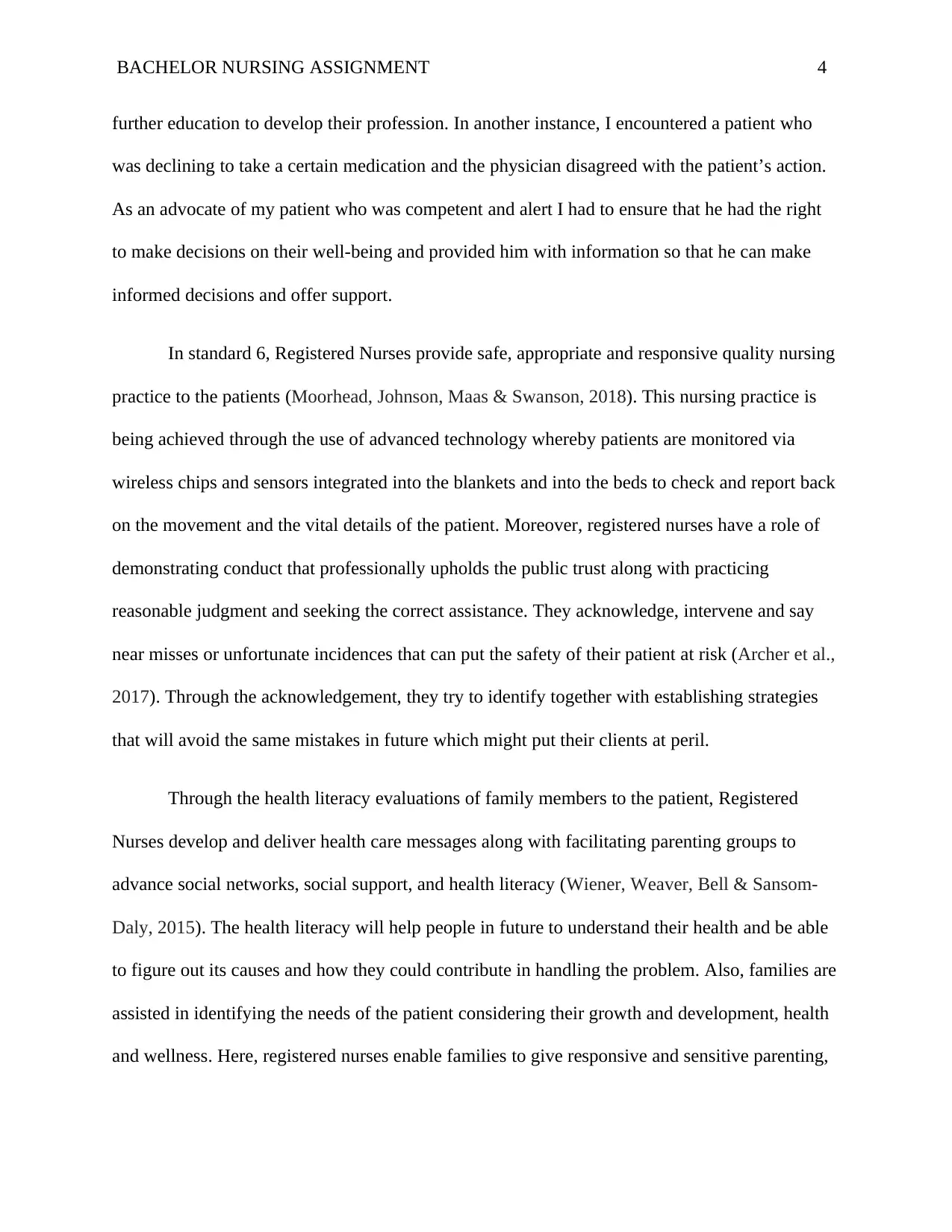
BACHELOR NURSING ASSIGNMENT 4
further education to develop their profession. In another instance, I encountered a patient who
was declining to take a certain medication and the physician disagreed with the patient’s action.
As an advocate of my patient who was competent and alert I had to ensure that he had the right
to make decisions on their well-being and provided him with information so that he can make
informed decisions and offer support.
In standard 6, Registered Nurses provide safe, appropriate and responsive quality nursing
practice to the patients (Moorhead, Johnson, Maas & Swanson, 2018). This nursing practice is
being achieved through the use of advanced technology whereby patients are monitored via
wireless chips and sensors integrated into the blankets and into the beds to check and report back
on the movement and the vital details of the patient. Moreover, registered nurses have a role of
demonstrating conduct that professionally upholds the public trust along with practicing
reasonable judgment and seeking the correct assistance. They acknowledge, intervene and say
near misses or unfortunate incidences that can put the safety of their patient at risk (Archer et al.,
2017). Through the acknowledgement, they try to identify together with establishing strategies
that will avoid the same mistakes in future which might put their clients at peril.
Through the health literacy evaluations of family members to the patient, Registered
Nurses develop and deliver health care messages along with facilitating parenting groups to
advance social networks, social support, and health literacy (Wiener, Weaver, Bell & Sansom-
Daly, 2015). The health literacy will help people in future to understand their health and be able
to figure out its causes and how they could contribute in handling the problem. Also, families are
assisted in identifying the needs of the patient considering their growth and development, health
and wellness. Here, registered nurses enable families to give responsive and sensitive parenting,
further education to develop their profession. In another instance, I encountered a patient who
was declining to take a certain medication and the physician disagreed with the patient’s action.
As an advocate of my patient who was competent and alert I had to ensure that he had the right
to make decisions on their well-being and provided him with information so that he can make
informed decisions and offer support.
In standard 6, Registered Nurses provide safe, appropriate and responsive quality nursing
practice to the patients (Moorhead, Johnson, Maas & Swanson, 2018). This nursing practice is
being achieved through the use of advanced technology whereby patients are monitored via
wireless chips and sensors integrated into the blankets and into the beds to check and report back
on the movement and the vital details of the patient. Moreover, registered nurses have a role of
demonstrating conduct that professionally upholds the public trust along with practicing
reasonable judgment and seeking the correct assistance. They acknowledge, intervene and say
near misses or unfortunate incidences that can put the safety of their patient at risk (Archer et al.,
2017). Through the acknowledgement, they try to identify together with establishing strategies
that will avoid the same mistakes in future which might put their clients at peril.
Through the health literacy evaluations of family members to the patient, Registered
Nurses develop and deliver health care messages along with facilitating parenting groups to
advance social networks, social support, and health literacy (Wiener, Weaver, Bell & Sansom-
Daly, 2015). The health literacy will help people in future to understand their health and be able
to figure out its causes and how they could contribute in handling the problem. Also, families are
assisted in identifying the needs of the patient considering their growth and development, health
and wellness. Here, registered nurses enable families to give responsive and sensitive parenting,
Paraphrase This Document
Need a fresh take? Get an instant paraphrase of this document with our AI Paraphraser
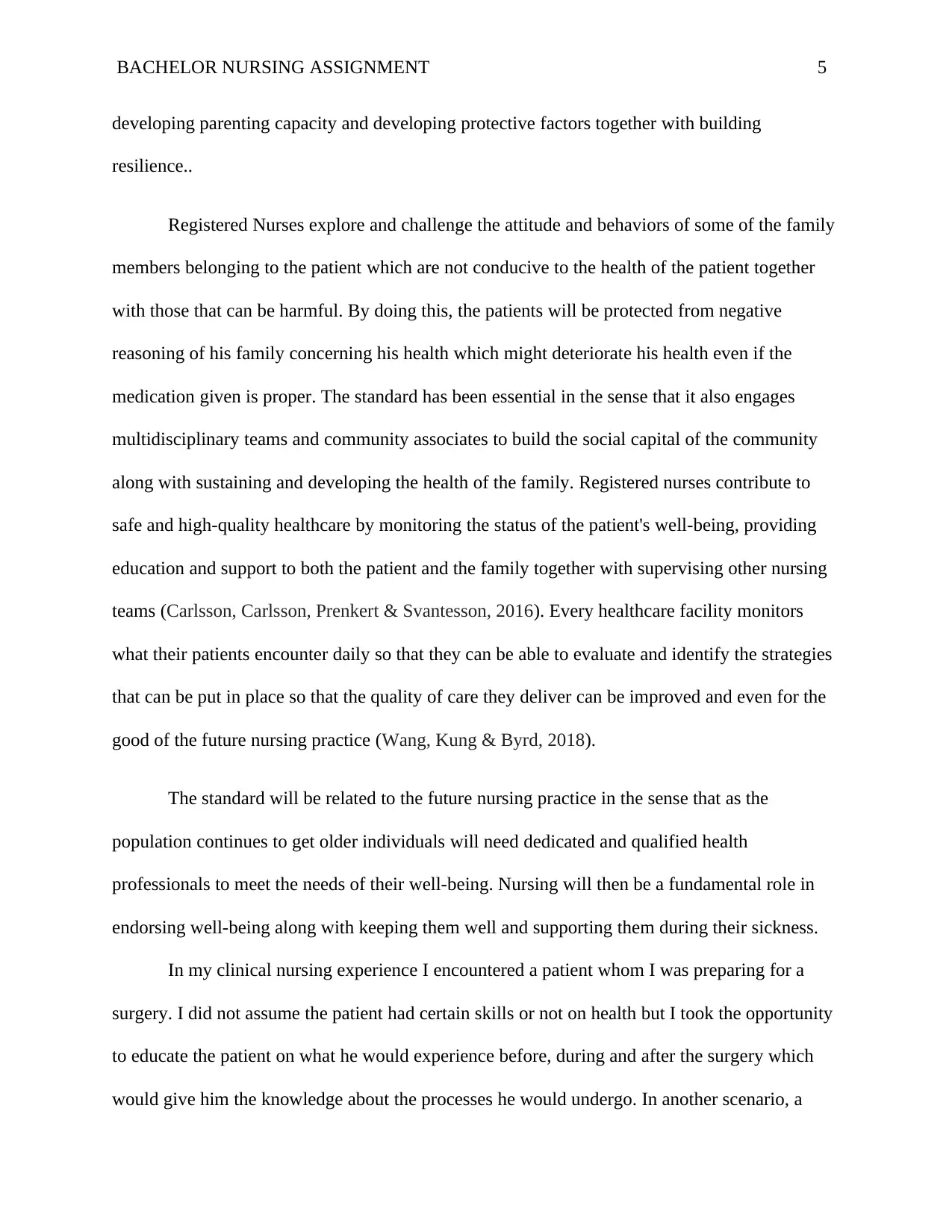
BACHELOR NURSING ASSIGNMENT 5
developing parenting capacity and developing protective factors together with building
resilience..
Registered Nurses explore and challenge the attitude and behaviors of some of the family
members belonging to the patient which are not conducive to the health of the patient together
with those that can be harmful. By doing this, the patients will be protected from negative
reasoning of his family concerning his health which might deteriorate his health even if the
medication given is proper. The standard has been essential in the sense that it also engages
multidisciplinary teams and community associates to build the social capital of the community
along with sustaining and developing the health of the family. Registered nurses contribute to
safe and high-quality healthcare by monitoring the status of the patient's well-being, providing
education and support to both the patient and the family together with supervising other nursing
teams (Carlsson, Carlsson, Prenkert & Svantesson, 2016). Every healthcare facility monitors
what their patients encounter daily so that they can be able to evaluate and identify the strategies
that can be put in place so that the quality of care they deliver can be improved and even for the
good of the future nursing practice (Wang, Kung & Byrd, 2018).
The standard will be related to the future nursing practice in the sense that as the
population continues to get older individuals will need dedicated and qualified health
professionals to meet the needs of their well-being. Nursing will then be a fundamental role in
endorsing well-being along with keeping them well and supporting them during their sickness.
In my clinical nursing experience I encountered a patient whom I was preparing for a
surgery. I did not assume the patient had certain skills or not on health but I took the opportunity
to educate the patient on what he would experience before, during and after the surgery which
would give him the knowledge about the processes he would undergo. In another scenario, a
developing parenting capacity and developing protective factors together with building
resilience..
Registered Nurses explore and challenge the attitude and behaviors of some of the family
members belonging to the patient which are not conducive to the health of the patient together
with those that can be harmful. By doing this, the patients will be protected from negative
reasoning of his family concerning his health which might deteriorate his health even if the
medication given is proper. The standard has been essential in the sense that it also engages
multidisciplinary teams and community associates to build the social capital of the community
along with sustaining and developing the health of the family. Registered nurses contribute to
safe and high-quality healthcare by monitoring the status of the patient's well-being, providing
education and support to both the patient and the family together with supervising other nursing
teams (Carlsson, Carlsson, Prenkert & Svantesson, 2016). Every healthcare facility monitors
what their patients encounter daily so that they can be able to evaluate and identify the strategies
that can be put in place so that the quality of care they deliver can be improved and even for the
good of the future nursing practice (Wang, Kung & Byrd, 2018).
The standard will be related to the future nursing practice in the sense that as the
population continues to get older individuals will need dedicated and qualified health
professionals to meet the needs of their well-being. Nursing will then be a fundamental role in
endorsing well-being along with keeping them well and supporting them during their sickness.
In my clinical nursing experience I encountered a patient whom I was preparing for a
surgery. I did not assume the patient had certain skills or not on health but I took the opportunity
to educate the patient on what he would experience before, during and after the surgery which
would give him the knowledge about the processes he would undergo. In another scenario, a
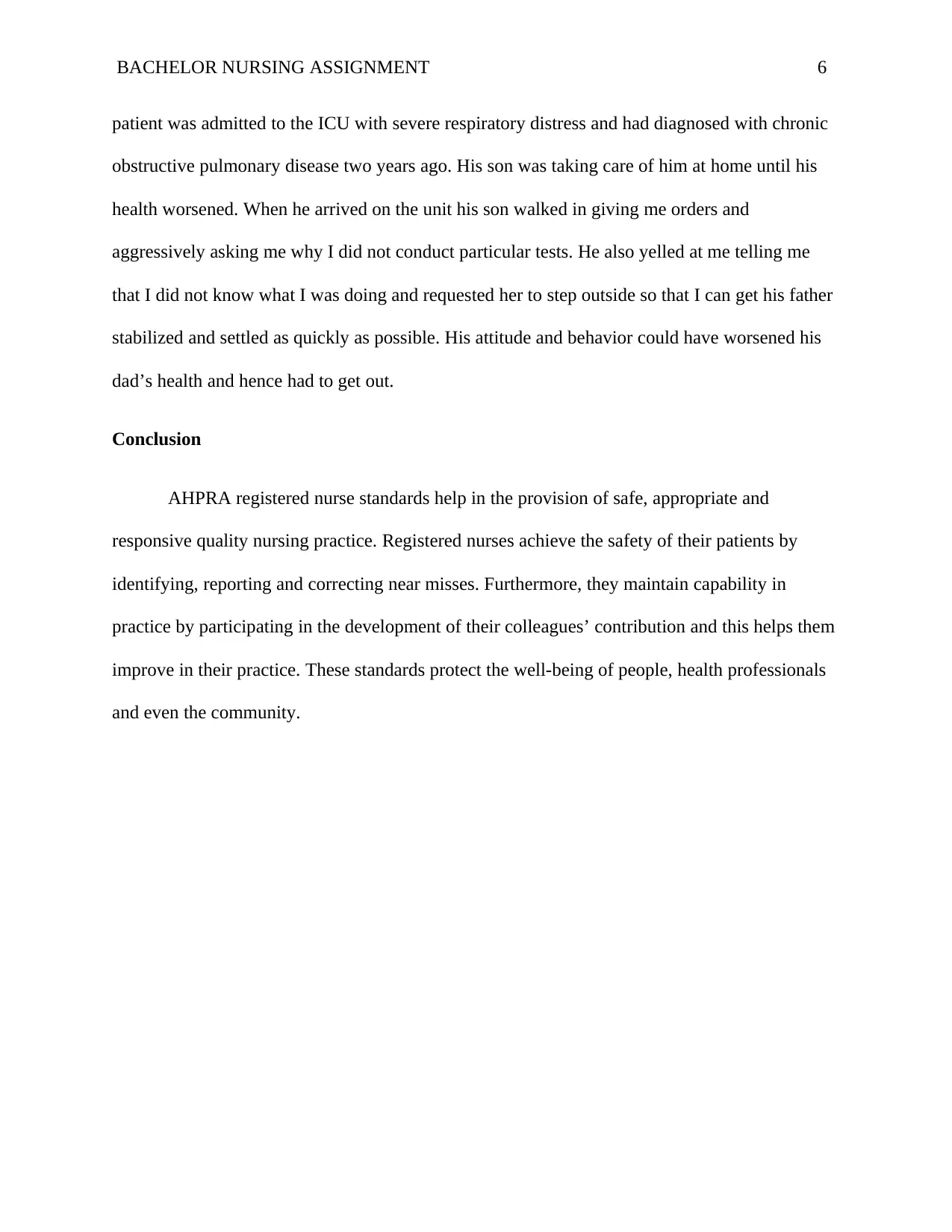
BACHELOR NURSING ASSIGNMENT 6
patient was admitted to the ICU with severe respiratory distress and had diagnosed with chronic
obstructive pulmonary disease two years ago. His son was taking care of him at home until his
health worsened. When he arrived on the unit his son walked in giving me orders and
aggressively asking me why I did not conduct particular tests. He also yelled at me telling me
that I did not know what I was doing and requested her to step outside so that I can get his father
stabilized and settled as quickly as possible. His attitude and behavior could have worsened his
dad’s health and hence had to get out.
Conclusion
AHPRA registered nurse standards help in the provision of safe, appropriate and
responsive quality nursing practice. Registered nurses achieve the safety of their patients by
identifying, reporting and correcting near misses. Furthermore, they maintain capability in
practice by participating in the development of their colleagues’ contribution and this helps them
improve in their practice. These standards protect the well-being of people, health professionals
and even the community.
patient was admitted to the ICU with severe respiratory distress and had diagnosed with chronic
obstructive pulmonary disease two years ago. His son was taking care of him at home until his
health worsened. When he arrived on the unit his son walked in giving me orders and
aggressively asking me why I did not conduct particular tests. He also yelled at me telling me
that I did not know what I was doing and requested her to step outside so that I can get his father
stabilized and settled as quickly as possible. His attitude and behavior could have worsened his
dad’s health and hence had to get out.
Conclusion
AHPRA registered nurse standards help in the provision of safe, appropriate and
responsive quality nursing practice. Registered nurses achieve the safety of their patients by
identifying, reporting and correcting near misses. Furthermore, they maintain capability in
practice by participating in the development of their colleagues’ contribution and this helps them
improve in their practice. These standards protect the well-being of people, health professionals
and even the community.
⊘ This is a preview!⊘
Do you want full access?
Subscribe today to unlock all pages.

Trusted by 1+ million students worldwide
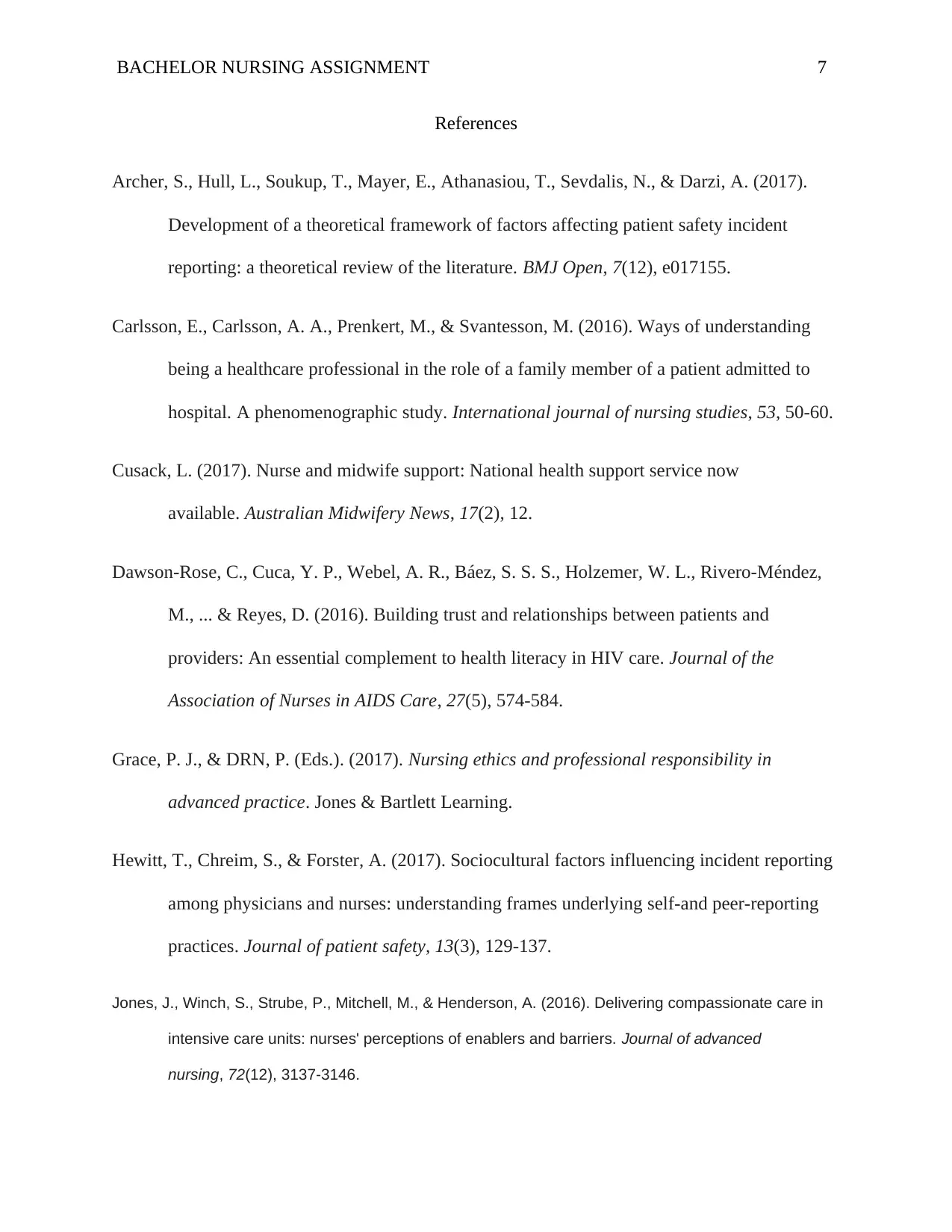
BACHELOR NURSING ASSIGNMENT 7
References
Archer, S., Hull, L., Soukup, T., Mayer, E., Athanasiou, T., Sevdalis, N., & Darzi, A. (2017).
Development of a theoretical framework of factors affecting patient safety incident
reporting: a theoretical review of the literature. BMJ Open, 7(12), e017155.
Carlsson, E., Carlsson, A. A., Prenkert, M., & Svantesson, M. (2016). Ways of understanding
being a healthcare professional in the role of a family member of a patient admitted to
hospital. A phenomenographic study. International journal of nursing studies, 53, 50-60.
Cusack, L. (2017). Nurse and midwife support: National health support service now
available. Australian Midwifery News, 17(2), 12.
Dawson-Rose, C., Cuca, Y. P., Webel, A. R., Báez, S. S. S., Holzemer, W. L., Rivero-Méndez,
M., ... & Reyes, D. (2016). Building trust and relationships between patients and
providers: An essential complement to health literacy in HIV care. Journal of the
Association of Nurses in AIDS Care, 27(5), 574-584.
Grace, P. J., & DRN, P. (Eds.). (2017). Nursing ethics and professional responsibility in
advanced practice. Jones & Bartlett Learning.
Hewitt, T., Chreim, S., & Forster, A. (2017). Sociocultural factors influencing incident reporting
among physicians and nurses: understanding frames underlying self-and peer-reporting
practices. Journal of patient safety, 13(3), 129-137.
Jones, J., Winch, S., Strube, P., Mitchell, M., & Henderson, A. (2016). Delivering compassionate care in
intensive care units: nurses' perceptions of enablers and barriers. Journal of advanced
nursing, 72(12), 3137-3146.
References
Archer, S., Hull, L., Soukup, T., Mayer, E., Athanasiou, T., Sevdalis, N., & Darzi, A. (2017).
Development of a theoretical framework of factors affecting patient safety incident
reporting: a theoretical review of the literature. BMJ Open, 7(12), e017155.
Carlsson, E., Carlsson, A. A., Prenkert, M., & Svantesson, M. (2016). Ways of understanding
being a healthcare professional in the role of a family member of a patient admitted to
hospital. A phenomenographic study. International journal of nursing studies, 53, 50-60.
Cusack, L. (2017). Nurse and midwife support: National health support service now
available. Australian Midwifery News, 17(2), 12.
Dawson-Rose, C., Cuca, Y. P., Webel, A. R., Báez, S. S. S., Holzemer, W. L., Rivero-Méndez,
M., ... & Reyes, D. (2016). Building trust and relationships between patients and
providers: An essential complement to health literacy in HIV care. Journal of the
Association of Nurses in AIDS Care, 27(5), 574-584.
Grace, P. J., & DRN, P. (Eds.). (2017). Nursing ethics and professional responsibility in
advanced practice. Jones & Bartlett Learning.
Hewitt, T., Chreim, S., & Forster, A. (2017). Sociocultural factors influencing incident reporting
among physicians and nurses: understanding frames underlying self-and peer-reporting
practices. Journal of patient safety, 13(3), 129-137.
Jones, J., Winch, S., Strube, P., Mitchell, M., & Henderson, A. (2016). Delivering compassionate care in
intensive care units: nurses' perceptions of enablers and barriers. Journal of advanced
nursing, 72(12), 3137-3146.
Paraphrase This Document
Need a fresh take? Get an instant paraphrase of this document with our AI Paraphraser
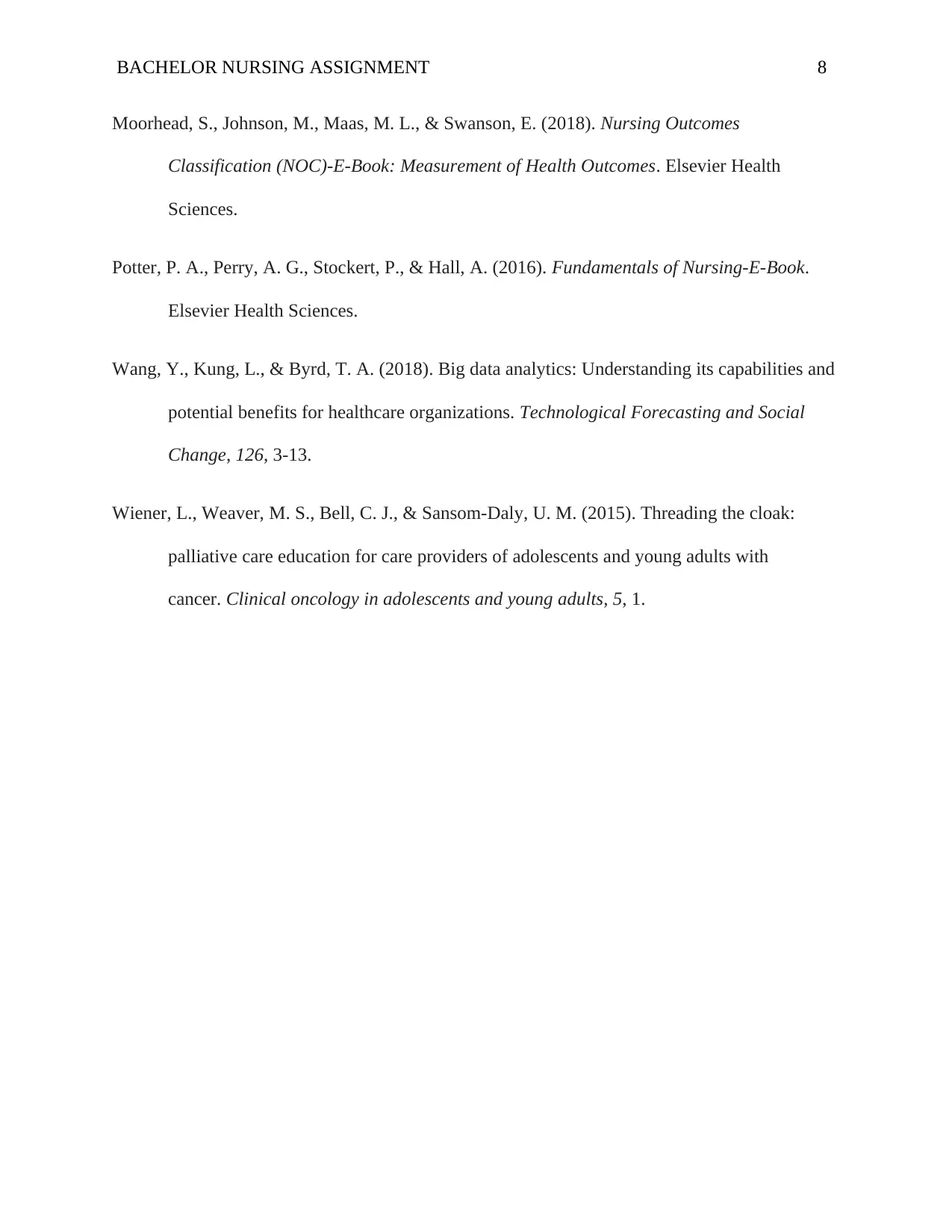
BACHELOR NURSING ASSIGNMENT 8
Moorhead, S., Johnson, M., Maas, M. L., & Swanson, E. (2018). Nursing Outcomes
Classification (NOC)-E-Book: Measurement of Health Outcomes. Elsevier Health
Sciences.
Potter, P. A., Perry, A. G., Stockert, P., & Hall, A. (2016). Fundamentals of Nursing-E-Book.
Elsevier Health Sciences.
Wang, Y., Kung, L., & Byrd, T. A. (2018). Big data analytics: Understanding its capabilities and
potential benefits for healthcare organizations. Technological Forecasting and Social
Change, 126, 3-13.
Wiener, L., Weaver, M. S., Bell, C. J., & Sansom-Daly, U. M. (2015). Threading the cloak:
palliative care education for care providers of adolescents and young adults with
cancer. Clinical oncology in adolescents and young adults, 5, 1.
Moorhead, S., Johnson, M., Maas, M. L., & Swanson, E. (2018). Nursing Outcomes
Classification (NOC)-E-Book: Measurement of Health Outcomes. Elsevier Health
Sciences.
Potter, P. A., Perry, A. G., Stockert, P., & Hall, A. (2016). Fundamentals of Nursing-E-Book.
Elsevier Health Sciences.
Wang, Y., Kung, L., & Byrd, T. A. (2018). Big data analytics: Understanding its capabilities and
potential benefits for healthcare organizations. Technological Forecasting and Social
Change, 126, 3-13.
Wiener, L., Weaver, M. S., Bell, C. J., & Sansom-Daly, U. M. (2015). Threading the cloak:
palliative care education for care providers of adolescents and young adults with
cancer. Clinical oncology in adolescents and young adults, 5, 1.
1 out of 8
Related Documents
Your All-in-One AI-Powered Toolkit for Academic Success.
+13062052269
info@desklib.com
Available 24*7 on WhatsApp / Email
![[object Object]](/_next/static/media/star-bottom.7253800d.svg)
Unlock your academic potential
© 2024 | Zucol Services PVT LTD | All rights reserved.



